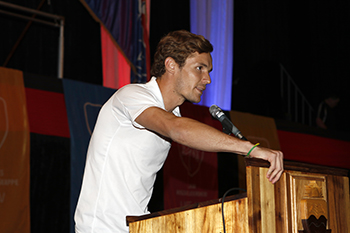Latest News Archive
Please select Category, Year, and then Month to display items
04 April 2024
|
Story Lunga Luthuli
|
Photo SUPPLIED
 Dr Juliet Kamwendo champions gender-inclusive climate action in Africa. Her expertise at the recently held AFR100 workshop highlighted vital steps towards sustainable and equitable development.
Dr Juliet Kamwendo champions gender-inclusive climate action in Africa. Her expertise at the recently held AFR100 workshop highlighted vital steps towards sustainable and equitable development.
Dr Juliet Kamwendo, Lecturer and Programme Director for Gender Studies in the Centre for Gender and Africa Studies at the University of the Free State, is spearheading efforts to integrate gender considerations into Africa's climate restoration agenda. Reflecting on her involvement, Dr Kamwendo stated, "This is particularly crucial, as women make up almost 50% of the population in Africa, and the depletion and degradation of land affect them disproportionately."
She recently served as a gender expert at the AUDA-NEPAD AFR100 workshop in Ouagadougou, Burkina Faso, from 25 to 29 March 2024. This initiative aims to restore forests and degraded land across Africa by 2030, with a focus on gender equality.
The workshop emphasised the integration of gender perspectives into the AFR100 project, acknowledging the disproportionate impact of land degradation on women. Dr Kamwendo's expertise highlighted the need to empower women in climate change interventions, addressing existing gender inequalities exacerbated by environmental degradation.
“Women – who are primarily responsible for household food security and water provision – bear the brunt of environmental degradation, leading to increased workloads, reduced income opportunities, and heightened vulnerability to climate-related disasters. Furthermore, the loss of forest cover and biodiversity further exacerbates the challenges faced by women, particularly in rural areas where they depend heavily on natural resources for their livelihoods,” added Dr Kamwendo.
Her participation highlights academia's crucial role in fostering inclusive and sustainable development, emphasising interdisciplinary collaboration to tackle complex environmental challenges. Through initiatives such as AFR100, stakeholders are working towards a more resilient and gender-responsive future for Africa.
I don’t see myself as a star, says Wayde
2016-09-20

The achievements of Wayde van Niekerk and his
fellow Kovsie athlete, Rynardt van Rensburg,
at the Olympic Games, were celebrated during
a celebration ceremony for them on
15 September 2016 in the Callie Human Centre.
Photo: Johan Roux
The environment surrounding him has changed a lot over the past few weeks, but Wayde van Niekerk doesn’t see himself as superstar. The 400 m Olympic champion is embracing being back home and is feeling the love of the Kovsie family that helped him reach great heights.
“I see this (the Bloemfontein Campus) as a place where I can find peace,” the University of the Free State (UFS) athlete said at a celebration ceremony on 15 September 2016 for him and fellow Olympian, Rynardt van Rensburg. The event celebrated their achievements after participation in the Olympic Games in Rio de Janeiro, Brazil. Their coaches, Tannie Ans Botha and Derek van Rensburg, were also honoured.
Van Niekerk looks ahead
“I am always excited to get back home,” Van Niekerk said. Everybody who means something to him is in Bloemfontein and on this campus. “I thank you for believing in me. I am only 24 years old and still have quite a few years left to keep on doing what I do.” He also conducted the official opening of the new KovsieFit gymnasium in the Callie Human Centre.
According to Prof Nicky Morgan, acting Vice-Chancellor and Rector, the attendees had “Wayde fever”. “We can’t really say thank you enough – at least for the association we have had with you (Van Niekerk) over the years.”
Rynardt didn’t expect best in Rio
“I see this (the Bloemfontein Campus)
as a place where I can find peace.”
Van Rensburg reached the semi-finals in Rio and ran a personal best of 1:45.33 in the 800 m. “If we don’t have support, we won’t be able to do this,” he said.
Although his form was improving prior to the Olympics, he didn’t expect to run a personal best. “My dad (and coach) kept believing in me and telling me it is possible to do.”